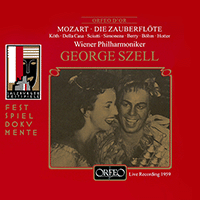Graziella Sciutti
Sciutti, whose father was an organist and her mother French, was born into a cultured family. At first she studied singing privately with Ginevra Marinuzzi and then, initially intending to become a concert singer, enrolled at the Accademia di Santa Cecilia, Rome, where her teacher was Rachele Margliano-Mori.
In 1948 Sciutti sang in an Italian radio broadcast of Mozart’s L’oca del Cairo and the following year made her concert debut in Venice with a programme of eighteenth-century songs. Gabriel Dussurget, the founder and director of the Aix-en-Provence Festival, heard this and engaged her to sing in Menotti’s comic opera The Telephone at the Festival in 1951, as well as Elisetta / Il matrimonio segreto. It was immediately apparent that opera suited her very well and she never looked back.
A frequent performer at Aix, Sciutti sang Susanna / Le nozze di Figaro (1952), Despina / Così fan tutte (1953) and Zerlina / Don Giovanni and in 1954 created the title part in Les Caprices de Marianne by Henri Sauguet. Also in that year she appeared at Glyndebourne as Rosina / Il barbiere di Siviglia, returning to sing Nanetta / Falstaff (also heard in Paris) and Susanna (1958), Despina (1959) and much later Fiorilla / Il turco in Italia (1970).
Sciutti’s participation in the opening production at the Teatrino di Corte in Naples of Paisiello’s Don Chisciotte in 1954 was followed by her singing Carolina in the Piccola Scala’s inaugural production of Il matrimonio segreto, given at the end of 1955 and repeated at the Edinburgh Festival in 1957. She went on to sing often in Milan (where she was affectionately known as ‘The Callas of the Piccola Scala’) in roles both well known – Papagena / Die Zauberflöte, Adèle / Le Comte Ory, Norina / Don Pasquale – and less familiar, including the title parts of Piccinni’s La Cecchina and Paisiello’s Nina, and Rosina in Paisiello’s Il barbiere di Siviglia.
After her debut at the Royal Opera House, London (as Oscar / Un ballo in maschera) Sciutti returned as Nanetta (1963, 1964), Susanna (1965) and Despina (1971, 1972). During the 1950s in Paris she collaborated with Sacha Guitry on Hahn’s Mozart and sang Polly in Weill’s Die Dreigroschenoper. A regular guest at the Vienna State Opera, where she sang Nanetta in the legendary Visconti / Bernstein production of Falstaff (1966), Sciutti also appeared frequently at the Salzburg Festival: as Despina (1958–1965), Papagena (1959–1960), Zerlina (1960–1961), Susanna (1962–1964, 1966), Serpetta / La finta giardiniera (1965) and Norina (1972). At the Holland Festival she sang Anne Trulove / The Rake’s Progress in 1957 and made her American debut in 1961 with the San Francisco Opera.
In 1975 Sciutti collaborated with John Copley at the Royal Opera on his new production of L’elisir d’amore and, following her full move into stage direction at Glyndebourne in 1977 (when she both produced and sang in Poulenc’s La Voix humaine) she produced quite widely, directing Le nozze di Figaro and L’elisir d’amore for Canadian Opera and restaging Così fan tutte at the Metropolitan Opera in 1984. She also staged Die Zauberflöte at Koblenz in 1985 and La Bohème for New York City Opera in 1995, a production which won an Emmy award when it was broadcast in 1997.
A successful revisiting of Sciutti’s first love, concert singing, came when she returned to London as a recitalist in 1982. She also taught extensively, in Aix, London, New York, Chicago and San Francisco.
Her voice was sweet, if not large, but projected very well. An infectious presence on stage, she brought tremendous life to all that she did. She recorded extensively.
© Naxos Rights International Ltd. — David Patmore (A–Z of Singers, Naxos 8.558097-100).

















